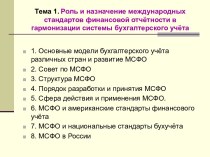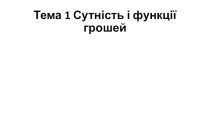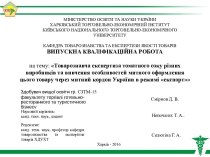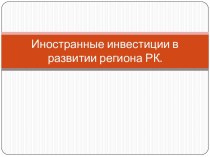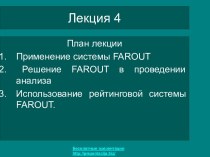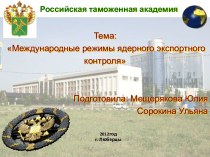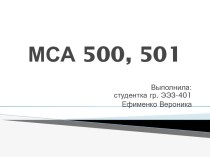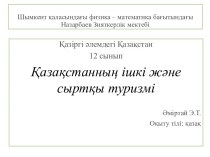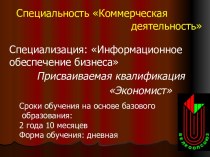- Главная
- Разное
- Бизнес и предпринимательство
- Образование
- Развлечения
- Государство
- Спорт
- Графика
- Культурология
- Еда и кулинария
- Лингвистика
- Религиоведение
- Черчение
- Физкультура
- ИЗО
- Психология
- Социология
- Английский язык
- Астрономия
- Алгебра
- Биология
- География
- Геометрия
- Детские презентации
- Информатика
- История
- Литература
- Маркетинг
- Математика
- Медицина
- Менеджмент
- Музыка
- МХК
- Немецкий язык
- ОБЖ
- Обществознание
- Окружающий мир
- Педагогика
- Русский язык
- Технология
- Физика
- Философия
- Химия
- Шаблоны, картинки для презентаций
- Экология
- Экономика
- Юриспруденция
Что такое findslide.org?
FindSlide.org - это сайт презентаций, докладов, шаблонов в формате PowerPoint.
Обратная связь
Email: Нажмите что бы посмотреть
Презентация на тему Wheat & feed market in Saudi Arabia
Содержание
- 2. GSFMO Background & Overview KSA Wheat &
- 3. GSFMO is a national institution that aims
- 4. GSFMO fulfills its mandate through managing the
- 5. GSFMO operates 14 branches with total capacity
- 6. GSFMO offers a wide range of Flour
- 7. *********As the sole wheat procurer, GSFMO is
- 8. GSFMO ensures its wheat supply from several
- 9. GSFMO Background & Overview KSA Wheat &
- 10. KSA’s population is expected to grow at
- 11. KSA average daily caloric intake is 14%
- 12. ForecastHistoricalIn 2025, flour demand in Saudi Arabia
- 13. Accordingly, GSFMO has adopted milling capacity upgrades
- 14. GSFMO Background & Overview KSA Wheat &
- 15. In line with the Government strategy, GSFMO
- 16. …that will cover all milling (both flour
- 17. Post-privatization, GSFMO will regulate the entire wheat
- 18. GSFMO Background & Overview KSA Wheat &
- 19. Скачать презентацию
- 20. Похожие презентации
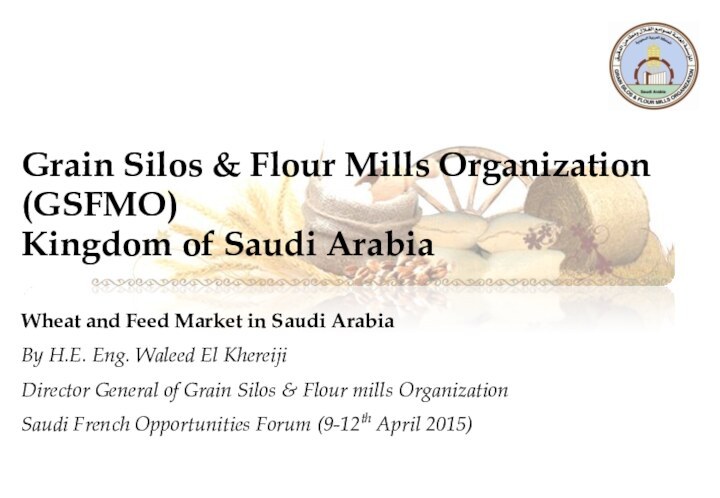

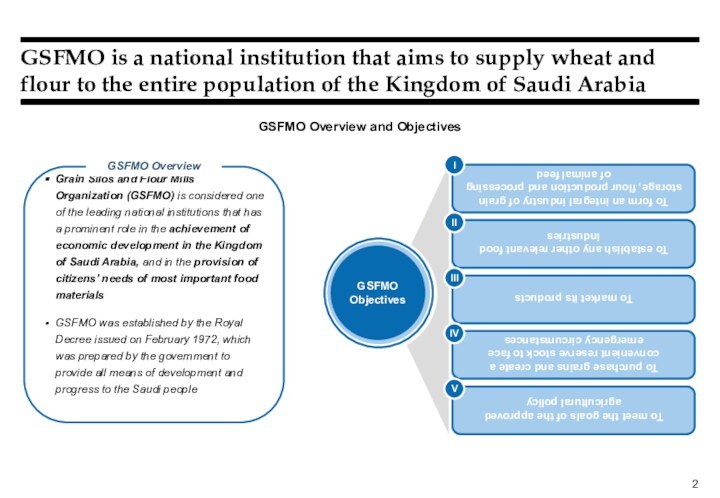

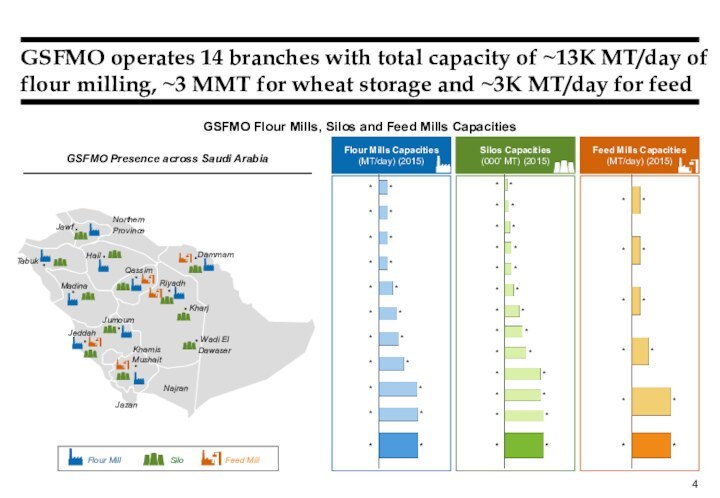


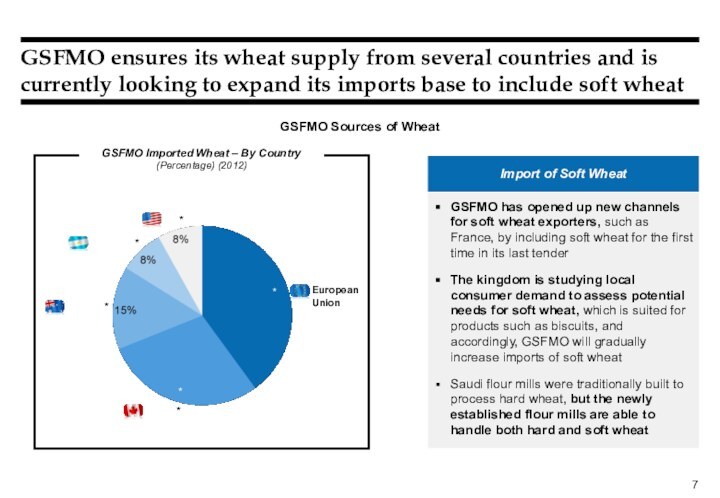

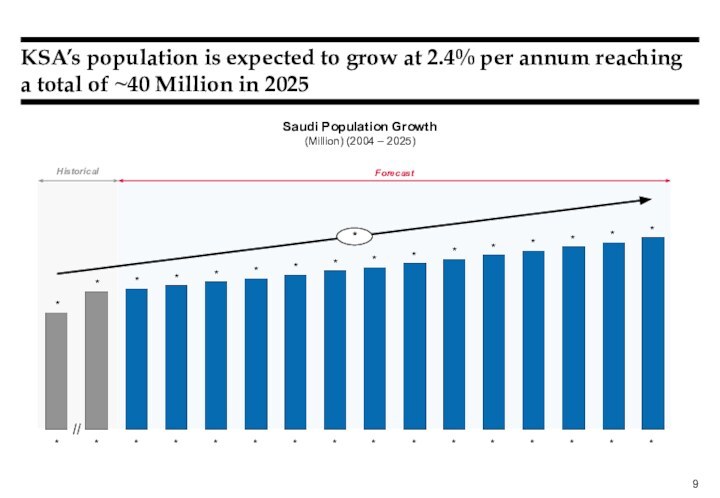

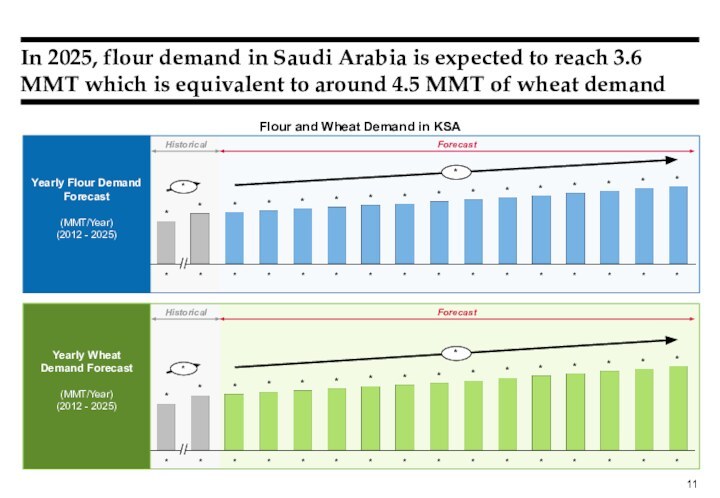
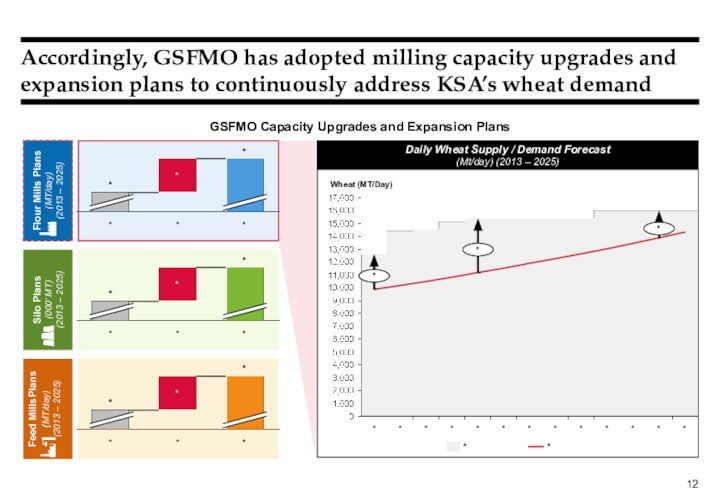
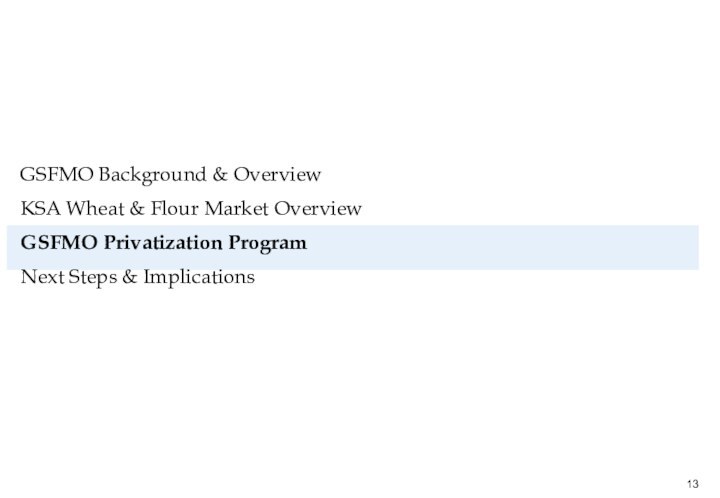
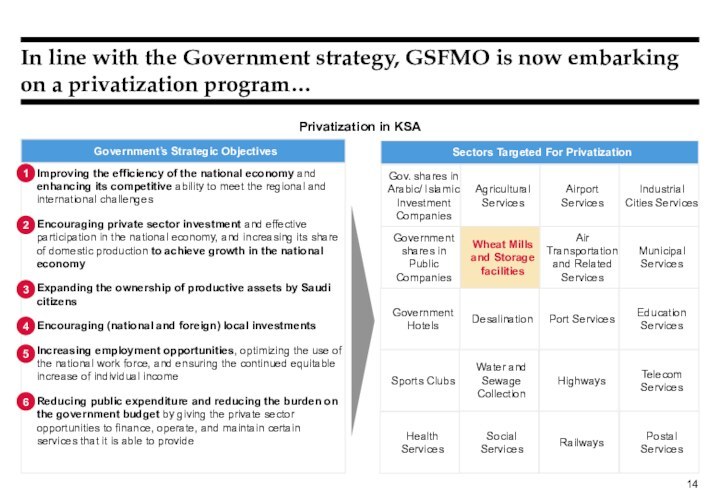

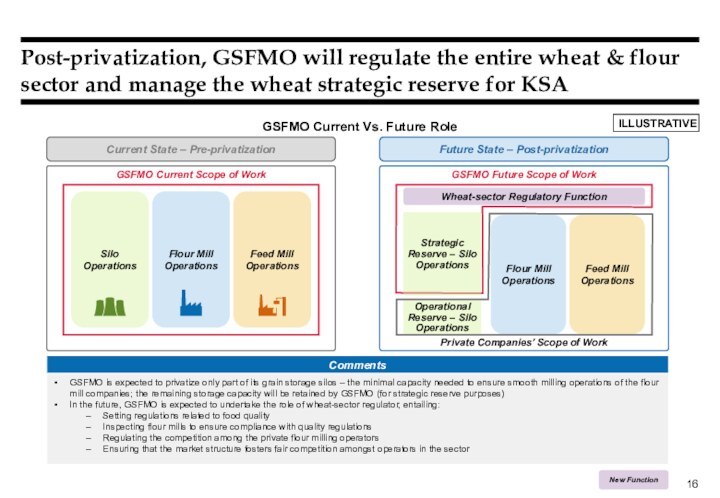
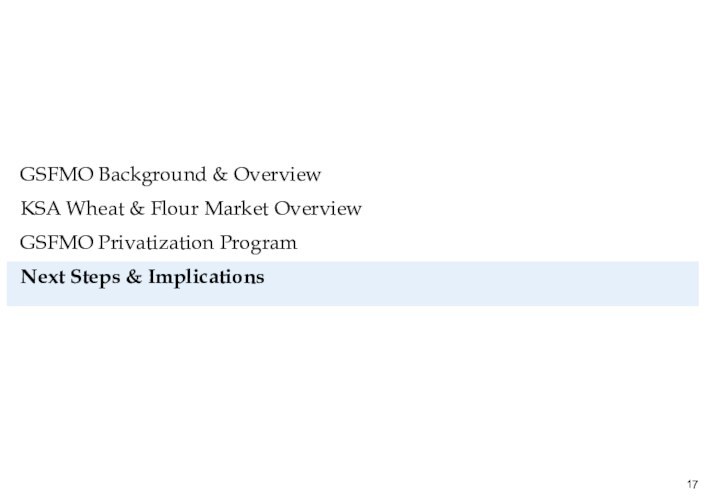
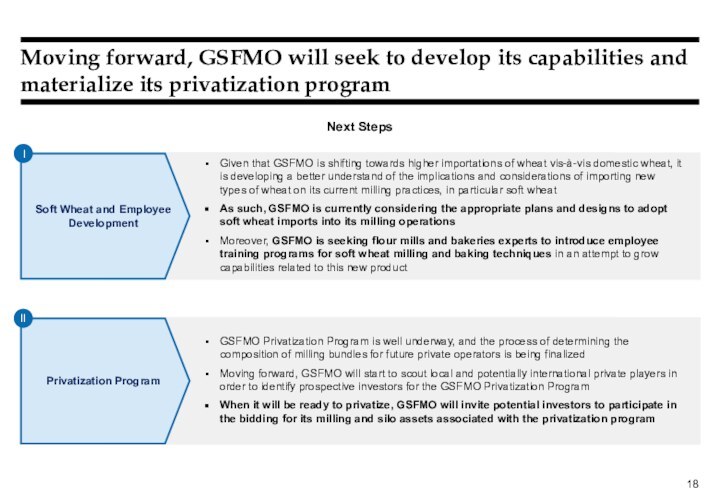
Слайд 2
GSFMO Background & Overview
KSA Wheat & Flour Market
Overview
GSFMO Privatization Program
Next Steps & Implications
Слайд 3 GSFMO is a national institution that aims to
supply wheat and flour to the entire population of
the Kingdom of Saudi ArabiaGSFMO Overview and Objectives
Grain Silos and Flour Mills Organization (GSFMO) is considered one of the leading national institutions that has a prominent role in the achievement of economic development in the Kingdom of Saudi Arabia, and in the provision of citizens’ needs of most important food materials
GSFMO was established by the Royal Decree issued on February 1972, which was prepared by the government to provide all means of development and progress to the Saudi people
GSFMO Overview
To form an integral industry of grain storage, flour production and processing of animal feed
To establish any other relevant food industries
To market its products
To purchase grains and create a convenient reserve stock to face emergency circumstances
To meet the goals of the approved agricultural policy
I
II
III
IV
V
Слайд 4
GSFMO fulfills its mandate through managing the full
wheat and flour operating sector value chain
Purchase wheat from
local farmers according to a set price and import the remaining demand from international suppliers for KSAOperate all the flour mills in Saudi Arabia and ensure adequate investments to maintain enough supply to satisfy the growing demand
Manage all wheat storage operations in KSA, both strategic and operational storage, in order to satisfy the increasing demand
Coordinate with Ministry of Agriculture on local wheat procurement, in order to complement it with international imports
Coordinate annually with Ministry of Finance on budget preparation and with Ministry of Planning and Economy on Strategies
Enforce food quality regulations at the point of purchase in storage silos and import tenders, such as protein content, weight, moisture, falling number, etc.
Implement directives by the Ministry of Health regarding food additives, e.g. vitamin D, Folic Acid, etc.
GSFMO Roles and Responsibilities
Roles and Responsibilities
Milling
Storage
KSA Wheat Sector Operations Value Chain
Transpo-rtation
Procurement
Distribution and Sales
Grain Silos & Flour Mills Organization
Grain Silos & Flour Mills Organization
Grain Silos & Flour Mills Organization
Grain Silos & Flour Mills Organization
Grain Silos & Flour Mills Organization
Private Sector Farmers
Entities Involved
GSFMO Involved
Production
Слайд 5 GSFMO operates 14 branches with total capacity of
~13K MT/day of flour milling, ~3 MMT for wheat
storage and ~3K MT/day for feedGSFMO Flour Mills, Silos and Feed Mills Capacities
Flour Mills Capacities
(MT/day) (2015)
Silos Capacities
(000’ MT) (2015)
Feed Mills Capacities
(MT/day) (2015)
*
*
*
*
*
*
*
*
*
*
*
*
*
*
*
*
*
*
*
*
*
*
*
*
*
*
*
*
*
*
*
*
*
*
*
*
*
*
*
*
*
*
*
*
*
*
*
*
*
*
*
*
*
*
*
*
*
*
*
*
GSFMO Presence across Saudi Arabia
Riyadh
Kharj
Jeddah
Hail
Madina
Qassim
Najran
Jazan
Northern Province
Khamis Mushait
Jawf
Wadi El Dawaser
Tabuk
Jumoum
Dammam
Слайд 6 GSFMO offers a wide range of Flour products,
Feed products and other Wheat Derivatives to its clients
Flour
ProductsGSFMO produces varieties of flour:
Powder flour (75-80% Extraction)
Fine flour (70-74% Extraction)
Ordinary Flour (85% Extraction)
Whole Wheat Flour (95% Extr.)
Feed Products
GSFMO produces feed-pound (50 kilograms) of high-quality poultry feed and livestock feed (fattening / double), in addition to other feed products
Other Wheat Derivatives
GSFMO produces a number of wheat derivatives including:
Jareesh
Harees
Bran for Human consumption
GSFMO Products
GSFMO Products
Слайд 7
*
*
*
*
*
*
*
*
*
As the sole wheat procurer, GSFMO is gradually
shifting towards 100% imports of international wheat by end
of 2016GSFMO Wheat Supply
Local Wheat Vs. Imported Wheat Supply
(MMT) (2008 – 2016)
*
*
Local Wheat (%)
85%
33%
40%
36%
28%
25%
18%
12%
0%
Imported Wheat (%)
15%
67%
60%
64%
72%
75%
82%
88%
100%
Comments
In 2008, the Saudi government adopted a new policy to gradually reduce domestic wheat growing due to water scarcity
The new policy envisaged replacement of domestic wheat procurement through imports; by 2016 all of the Kingdom’s wheat demand will be met by imports
GSFMO started applying the new policy in 2008 by importing 303 thousand tons of wheat; this quantity was increased six fold in 2009 to reach 1.92 MMT
On the other hand, the local procurement of wheat was decreased from 1.72 million tons in 2008 to 778 thousand tons in 2012
Historical
Planned
Слайд 8
GSFMO ensures its wheat supply from several countries
and is currently looking to expand its imports base
to include soft wheatGSFMO Imported Wheat – By Country
(Percentage) (2012)
*
*
*
*
*
*
European Union
GSFMO Sources of Wheat
Import of Soft Wheat
GSFMO has opened up new channels for soft wheat exporters, such as France, by including soft wheat for the first time in its last tender
The kingdom is studying local consumer demand to assess potential needs for soft wheat, which is suited for products such as biscuits, and accordingly, GSFMO will gradually increase imports of soft wheat
Saudi flour mills were traditionally built to process hard wheat, but the newly established flour mills are able to handle both hard and soft wheat
Слайд 9
GSFMO Background & Overview
KSA Wheat & Flour Market
Overview
GSFMO Privatization Program
Next Steps & Implications
Слайд 10
KSA’s population is expected to grow at 2.4%
per annum reaching a total of ~40 Million in
2025Saudi Population Growth
(Million) (2004 – 2025)
*
*
*
*
*
*
*
*
*
*
*
*
*
*
*
*
*
*
*
*
*
*
*
*
*
*
*
*
*
*
*
*
*
Historical
Forecast
Слайд 11 KSA average daily caloric intake is 14% above
the world average resulting in higher flour consumption habits
Average
Caloric Intake Benchmarks(Cal/Capita per Day) (2010)
*
*
*
*
*
*
*
*
*
*
*
*
*
*
*
*
*
*
*
*
*
*
*
*
*
*
*
*
*
*
*
*
*
*
*
*
Average Flour Consumption Benchmarks
(Cal/Capita per Day) (2012)
Слайд 12
Forecast
Historical
In 2025, flour demand in Saudi Arabia is
expected to reach 3.6 MMT which is equivalent to
around 4.5 MMT of wheat demand*
*
*
*
*
*
*
*
*
*
*
*
*
*
*
*
*
*
*
*
*
*
*
*
*
*
*
*
*
*
*
*
*
*
Forecast
Historical
*
*
*
*
*
*
*
*
*
*
*
*
*
*
*
*
*
*
*
*
*
*
*
*
*
*
*
*
*
*
*
*
*
*
Yearly Flour Demand Forecast
(MMT/Year)
(2012 - 2025)
Yearly Wheat Demand Forecast
(MMT/Year)
(2012 - 2025)
Flour and Wheat Demand in KSA
Слайд 13 Accordingly, GSFMO has adopted milling capacity upgrades and
expansion plans to continuously address KSA’s wheat demand
GSFMO Capacity
Upgrades and Expansion PlansFlour Mills Plans
(MT/day)
(2013 – 2025)
Silo Plans
(000’ MT)
(2013 – 2025)
Feed MillsPlans
(MT/day)
(2013 – 2025)
*
*
*
*
*
*
*
*
*
*
*
*
*
*
*
*
*
*
Daily Wheat Supply / Demand Forecast
(Mt/day) (2013 – 2025)
*
*
*
*
*
*
*
*
*
*
*
*
Wheat (MT/Day)
*
*
*
*
*
*
Слайд 14
GSFMO Background & Overview
KSA Wheat & Flour Market
Overview
GSFMO Privatization Program
Next Steps & Implications
Слайд 15 In line with the Government strategy, GSFMO is
now embarking on a privatization program…
Privatization in KSA
Government’s Strategic
ObjectivesImproving the efficiency of the national economy and enhancing its competitive ability to meet the regional and international challenges
Encouraging private sector investment and effective participation in the national economy, and increasing its share of domestic production to achieve growth in the national economy
Expanding the ownership of productive assets by Saudi citizens
Encouraging (national and foreign) local investments
Increasing employment opportunities, optimizing the use of the national work force, and ensuring the continued equitable increase of individual income
Reducing public expenditure and reducing the burden on the government budget by giving the private sector opportunities to finance, operate, and maintain certain services that it is able to provide
Sectors Targeted For Privatization
Gov. shares in Arabic/ Islamic Investment Companies
Agricultural Services
Airport Services
Industrial Cities Services
Government shares in Public Companies
Wheat Mills and Storage facilities
Air Transportation and Related Services
Municipal Services
Government Hotels
Desalination
Port Services
Education Services
Sports Clubs
Water and Sewage Collection
Highways
Telecom Services
Health Services
Social Services
Railways
Postal Services
1
2
3
4
5
6
Слайд 16 …that will cover all milling (both flour and
feed) and some storage activities
Distribution
Milling
Storage
Transportation
Procurement
Value Chain
Current
Players
GSFMO (imports)
Private
FarmersPrivate agricultural
Development companies
Private distributors and wholesalers
Private retailers and bakeries
Grain Silos Flour Mills Organization (GSFMO)
Sudais, Al-Mousallam,
ARASCO, Al-Habbad,
Al-Shorreih
Assumed to remain public
Government assumed to continue to perform procurement role
Leverages purchasing power and ensures availability of wheat
Privatization
Potential?
Rationale
GSFMO currently is the sole entity performing storage and milling activities
All milling and some storage activities will be privatized
Status
Scope of GSFMO Privatization
GSFMO Scope of Privatization
Слайд 17 Post-privatization, GSFMO will regulate the entire wheat &
flour sector and manage the wheat strategic reserve for
KSAILLUSTRATIVE
GSFMO Current Vs. Future Role
Current State – Pre-privatization
Future State – Post-privatization
Silo Operations
Flour Mill Operations
Feed Mill Operations
GSFMO Current Scope of Work
GSFMO Future Scope of Work
Wheat-sector Regulatory Function
Flour Mill Operations
Feed Mill Operations
Strategic Reserve – Silo Operations
Operational Reserve – Silo Operations
Private Companies’ Scope of Work
Comments
GSFMO is expected to privatize only part of its grain storage silos – the minimal capacity needed to ensure smooth milling operations of the flour mill companies; the remaining storage capacity will be retained by GSFMO (for strategic reserve purposes)
In the future, GSFMO is expected to undertake the role of wheat-sector regulator, entailing:
Setting regulations related to food quality
Inspecting flour mills to ensure compliance with quality regulations
Regulating the competition among the private flour milling operators
Ensuring that the market structure fosters fair competition amongst operators in the sector
New Function
